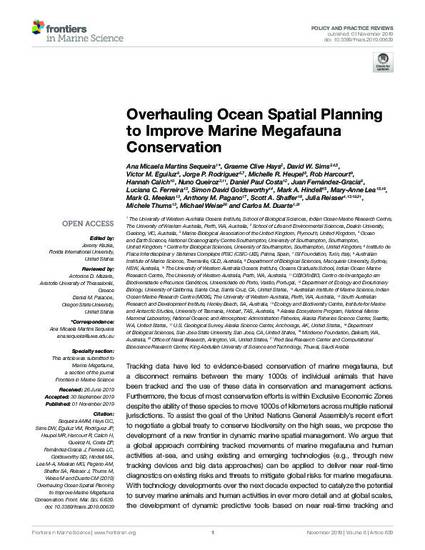
Article
Overhauling Ocean Spatial Planning to Improve Marine Megafauna Conservation
Frontiers in Marine Science
(2019)
Abstract
Tracking data have led to evidence-based conservation of marine megafauna, but a disconnect remains between the many 1000s of individual animals that have been tracked and the use of these data in conservation and management actions. Furthermore, the focus of most conservation efforts is within Exclusive Economic Zones despite the ability of these species to move 1000s of kilometers across multiple national jurisdictions. To assist the goal of the United Nations General Assembly’s recent effort to negotiate a global treaty to conserve biodiversity on the high seas, we propose the development of a new frontier in dynamic marine spatial management. We argue that a global approach combining tracked movements of marine megafauna and human activities at-sea, and using existing and emerging technologies (e.g., through new tracking devices and big data approaches) can be applied to deliver near real-time diagnostics on existing risks and threats to mitigate global risks for marine megafauna. With technology developments over the next decade expected to catalyze the potential to survey marine animals and human activities in ever more detail and at global scales, the development of dynamic predictive tools based on near real-time tracking and environmental data will become crucial to address increasing risks. Such global tools for dynamic spatial and temporal management will, however, require extensive synoptic data updates and will be dependent on a shift to a culture of data sharing and open access. We propose a global mechanism to store and make such data available in near real-time, enabling a holistic view of space use by marine megafauna and humans that would significantly accelerate efforts to mitigate impacts and improve conservation and management of marine megafauna.
Disciplines
Publication Date
November 1, 2019
DOI
10.3389/fmars.2019.00639
Publisher Statement
This article was published in Sequeira AMM, Hays GC, Sims DW, Eguíluz VM, Rodríguez JP, Heupel MR, Harcourt R, Calich H, Queiroz N, Costa DP, Fernández-Gracia J, Ferreira LC, Goldsworthy SD, Hindell MA, Lea M-A, Meekan MG, Pagano AM, Shaffer SA, Reisser J, Thums M, Weise M and Duarte CM (2019) Overhauling Ocean Spatial Planning to Improve Marine Megafauna Conservation. Front. Mar. Sci. 6:639. doi: 10.3389/fmars.2019.00639, and can also be found at this link. Authors retain copyright.
Citation Information
Ana Micaela Martins Sequeira, Graeme Clive Hays, David W. Sims, Víctor M. Eguíluz, et al.. "Overhauling Ocean Spatial Planning to Improve Marine Megafauna Conservation" Frontiers in Marine Science (2019) Available at: http://works.bepress.com/scott_shaffer/83/
Creative Commons license

This work is licensed under a Creative Commons CC_BY International License.
